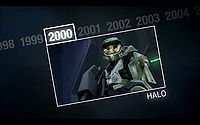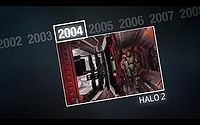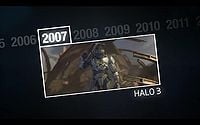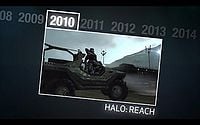Bungie ViDoc: O Brave New World: Difference between revisions
From Halopedia, the Halo wiki
| Line 312: | Line 312: | ||
{{Expand-Section}} | {{Expand-Section}} | ||
=== | ===My God, It's Full of Stars=== | ||
{{Expand-Section}} | {{Expand-Section}} | ||
Revision as of 06:09, August 11, 2011
The Bungie ViDoc: O Brave New World is the last Halo-related ViDoc made by Bungie. It was released on YouTube on August 3, 2011.[1] It runs for 55:08, and summarizes Bungie's history and future, as well as Halo's creation.
Transcript
The Bungie logo is presented.
- Luke Timmins: "In many ways, it's one of the best things that ever happened to Bungie, right?"
- "What I really like about this whole Bungie relationship with Activision is that I never saw it coming."
- Jerry Holkins: "The idea that Bungie would make Halo for a million years was inconceivable."
- Eric Osborne: "In a lot of ways, we're starting over."
- Geoff Keighley: "I can't wait to see where Bungie is going to take us next. I know it's going to be ambitious, I know it's going to be exciting. I just want find some details on it."
- Luke Timmins: Being an underdog, and having something to prove and remembering we're not the top dog any more is a great thing to happen to us.
- Curtis Creamer: "We're out on our own in the wilderness again and we have to fight to bring every customer along with us."
- Joseph Staten: "We've gone from a totally as sure as a thing can get with Halo, to tackling a challenge which is even bigger than Halo with no real guarantee of success."
- Martin O'Donnell: "There has to be some scare dangling over the edge of the cliff and hope that the world we are weaving will hold us."
- "I love being the underdog!"
- Jason Jones: "It does bring back the early days. We have this great idea and we don't really understand it. Its going to be fun to figure it out."
A group of pixels form together in a similar way to either Pong or Gnop which later transfigure into a timeline which moves between 1991, 1992, 1993, 1994, 1995, 1995, 1997/1998, 2001, 2001, 2004, 2007, 2009 and 2010 simultaneously which showing brief snippets of games Bungie developed in those specific years.
Bungie 20th Anniversary
O Brave New World
- Alexander Seropian: "My senior in college was taking an artifical intelligence class, and Jason was in that class. He had a way cooler computer than I did, which really pissed me off. You know, so we just got to talking and tried partnering up."
- Martin O'Donnell: It was clear, right from the get-go that Alex was the business guy, Jason was the creative guy."
- Jason Jones: "I was working on a game and Alex was trying to start a company."
- Alexander Seropean: "So here we are in down town Chicago. This is the classiest part of town. The original Bungie was not here. For that, we've got to go south."
- "We occupied the second floor, so we got broken into a couple of times."
- "There was that crack house behind the building."
- Robert McLees: "I was employee number five. We were in one room... Well, a room and a half. Everybody did did everything."
- Jason Jones: "We ended up with Pathways."
- "Pathways into Darkness was our first successful game. It had made a profit."
Gameplay of Pathways is presented.
- Alexander Seropean: "Then came Marathon, which was a real big hit for us."
Marathon gameplay is is presented.
- Claude Errera: "Marathon was the first shooter which had verticality to it."
- Geoff Keighley: "It had that Sci-Fi sensibility. Mac gaming didn't really exist for me before Marathon."
- Lorraine McLees: "Marathon made me dizzy!"
- "I remember being amazed at this world that Bungie had created."
- Alexander Seropean: "We were bound by the comradery. It was our lives; 24/7. It was kind of like being in a band."
- Martin O'Donnell: "But the project that we were working on which was called Myth, which I though was really interesting."
- Alexander Seropean: One of the most significant things that we had done with Myth was we developed it for both the Mac and the PC at the same time."
- Geoff Keighley: "It was interesting how Bungie was able to nail both first-person shooters for the Mac and move to the other big genre which was Strategy games for the PC, and then nail that with Myth."
- Claude Errera: "Myth's the first time that Real-time strategy didn't have micro managing built into it."
Myth gameplay is presented.
- Mike Krahulik: "Myth was a revolution. It was an RTS which got rid of all of the bullshit."
- Lorraine McLees: "You use the terrain to your advantage. Which isn't something that a lot of games did at the time."
- Martin O'Donnell: "I definitely did not think Bungie would last. It didn't seem like they had a real plan for the future."
- Jason Jones: "We had the advantage twenty years ago of being really stupid. I mean young, but young is stupid. In that mind set, anything is possible. So you just get started and figure out what is hard on the way."
- Dave Dunn: "The first time I meet Jason, he said 'Why are you okay with building environments the way your making environments?', and I said 'Like I have a choice?' and he said 'Yeah, absolutely!'. I was 'Ah, so that is what our culture is about'."
- Alexander Seropean: I think it all starts with the idea that we were our own customer and that anyone else who going to play our games, we were in their shoes."
- Dave Dunn: "A big moment in Bungie, I think one that stands out to me, more than anything elses, is the Myth II installer bug."
- Jerry Holkins: "That installer bug that would remove your computer. You try to uninstall the game, it was just a scorched earth policy, like, 'Well, you don't like Myth? Fuck you!'"
- Mike Krahulik: "'We're taking your machine!'"
- Martin O'Donnell: "There was five hundred thousands units that were boxed, shrink wrapped and everything else."
- Dave Dunn: "Alex decided to do the right thing and recalled all of the copies."
- Martin O'Donnell: "It was just horrible. They had to reprint all the discs."
- Dave Dunn: "Everyone in the office was just stuffing new CDs into boxes of Myth II."
- Shi Kai Wang: "That caused the company a good chunk of money."
- Martin O'Donnell: "It was at least a million dollars stake."
- Dave Dunn: "A mistep like that is going to put you in some serious jeopardy."
So Our Game Is Called Halo...
The timeline appears at 2000, with an image of John-117 beside it. It is followed by many footages of Halo: Combat Evolved. The footage stops as the Halo logo appears.
- Marcus Lehto: "It started off with just three of us. We were at that time making what we thought was gonna turn out to be a Myth-type clone, with a sci-fi skin on it."
- Martin O'Donnell: "Thy were doing "Blam!", which was the codename for this other game they were working on."
- Jason Jones: "We had a huge map for a continuous RPG and before that we had an RTS."
- Shi Kai Wang: "We had no idea what the game was going to be, I had no idea. I was just their to do concepts."
- Marcus Lehto: "It was pretty generic Sci-Fi. You had your typical military forces, tanks, jeeps, that kind of things and some armored guys."
- Jason Jones: "We did a lot of thinking about what it meant to be an action game. And could a action be a Real-time strategy game? And the answer was no."
- Shi Kai Wang: *We want a Sci-Fi character, a guy in a suit who can go from Earth to space and we don't have to worry about him changing clothes. And we just needed him to look like a Space marine."
- Marcus Lehto: "Oh god, what do we call him? Something like the super soldier."
- Shi Kai Wang: "And then we started moving the camera closer and closer to the character."
- Marcus Lehto: "What if we put ourselves in this character, what if we became that character?"
- Eric Osborne: "Those are the moments were things start to come together. Marcus saying 'No,no, we're going first-person because this is more fun'."
- Shi Kai Wang: "I don't think we could have captured as much of the audience if we had decided had we stayed in Third-person."
- Eric Osborne: "Those are the ideas and decisions which really change the course of the game and the company."
- Martin O'Donnell: "Suddenly we had this opportunity to tell a little piece of a story. I remember Joe coming to me and saying 'Anchient, epic, alien'. So he just gave me those three words and I though okay, well I'll just try combining something that does that. I came up with the pounding drums, Chellos, monks, alien voice and showed it to the guys on monday morning and then they got on a plane to go to New York and show it at Mac world the next day.."
- Alexander Seropean: "Which really went over, big."
- Geoff Keighley: "They were making games for the Mac which you know was still a small and stall-based at the time. But you know, Bungie was into pretty ambitious games and to fund games of that calibre is not easy to do."
- Ed Fries: "One day, my phone rings; telling me that Bungie is in financial trouble and that their talking to some people about potentially being acquired."
- Alexander Seropean: "It was going to be really important for Microsoft to have games for the Xbox. That is what would make or break it. So you know, we call up at freeze and said 'Maybe we should talk'."
- Ed Fries: "That was a great call to get, it was definitely a time were I was open to that kind of a conversation and had money to spend and desperately needed content for this new platform that was going to be showing up in less than two years."
- "We knew that there were some financial struggles at that point in time. There was some strange dudes in black suits walking around the office, weeks prior to that and so we knew something was going on."
- Chris Barrett: "I had been there for something like a couple of months and then I get called into Alex's office and he's like 'So, we might be moving to Seattle' and I was like 'Oh god, you know I just signed a lease!'.
- Ed Fries: "This was a group that while I respected their talent because I had seen their previous games. I mean, I probably would have been interested in them just for the team. But that fact that they had this Halo thing that they were trying to figure out was a plus."
- Jordan Weisman: "Ed came into me one day and said that 'I want you to go talk to Jason and Alex and tell them its all going to be okay once we buy them."
- Joseph Staten: "Greed, fair and simple. Cashed it in, sold our souls, came out here. I mean if you're going to sell your souls, Seattle's a pretty nice place to do it."
- "Back in the 90s, Microsoft had an evil empire like quality to them, and the idea that they were going to Microsoft was 'OH NO, they're selling out!'."
- Shi Kai Wang: "That turning point of us going from PC games to Console was gigantic and it was a giant gamble."
- Geoff Keighley: "Bungie, I think presented a great opportunity for them, but I think it was incredibly risk worthy too."
- Harold Ryan: "One of the main polls for the team to move into Microsoft was to be a part of creating the Xbox and a game that reall used."
- Chris Butcher: "Jason said it best, I think; he said that 'Microsoft has built the biggest canon in the world and they're pointing it right at Sony and that we can be a bullet in that canon, and we can make a really big impact on the course of the game history'."
- Alexander Seropean: "We got very excited about the opportunity to define and a platform and to define a franchise would be important to the platform."
- Shi Kai Wang: Everybody in the office was pissed off because we like being independent and, you know kind of like a 'Fuck the man!' kind of thing and now we got to the console and now we're like 'Hey there, man'! and we're like shaking his hands, *laughs*. Instead of raising our fists up."
- Chris Butcher: "It was exciting, as well as terrifying."
- Ed Fries: "I had this nice spot in this building picked out for them in this building and thought they would love it and they hated it. You know, it was a typical Microsoft office which the Microsoft people think are great. The Bungie guys looked at me and said 'This looks awful! This is the exact opposite of what we want. You know, we want a big open space and just mow down all of these walls of this section'."
- "People just couldn't fathom being at Microsoft."
- Jordan Weisman: "I remember Ed complaining that even he didn't have a key to get into the Bungie area."
- Geoff Keighley: "The challenge that I think Halo faces is that it was trying to do First-person shooter on a console platform."
- Ed Fries: "One of the biggest challenges was making Shooter that felt right and worked right on a controller."
- Mike Krahulik: "Yeah, I mean originally, you had to struggle with it being a FPS that we were trying to get into on a console, on a controller, on the duke. It was huge. Coming from PC First-person shooters, it just really felt..."
- Jerry Holkins: "Different?"
- Mike Krahulik: "Different!"
- "The reality of shipping on a console, it was a lot of pressure there. And we didn't have anything running on that console, at all."
- Chris Butcher: "When I joined, the AI for Halo was about three source files and the big block comments at the top that were just Jason's log of him frantically trying to get something up and running. Jaime Griesemer and myself, we just sat and worked on two signature encounters, one was the beach on The Silent Cartographer, which was the classic kind of way of advancing encounter and the other one was the classic defensive encounter. We really only had one shot at it because we weren't going to have time to go back and scrap the AI system. So we just knew we had to get it right."
- "We had a lot of content to build, gameplay experience to create. So all of these grand ideas we had of this huge open world experience quickly dissipated."
- Claude Errera: "Bungie has always had a way of figuring out what is important in a a particular game style and throwing away the extreme stuff."
- Pete Parsons: "I think there were a small group of people who felt like Halo would be the defining game of the Xbox."
- Curtis Creamer: "There were a lot of other games which were getting a lot more attention than Halo. Malice, Munch's Oddysee, racing game."
- Shi Kai Wang: "I think they put a lot of bets on this game called Azurik. I'm not sure if anybody remembers that."
- "Master Chief was certainly a part of it, but he wasn't 'the guy'."
- "It wasn't pre-ordained that it was going to be Halo. Halo earned that right, you know, by being one of the best titles in development at the time."
- Dave Dunn: "On Halo, one of the moments that always sticks out in my mind was once we actually got B30 up and running and you could play it."
- Curtis Creamer: "There's something simple about driving the Warthog which was fun. That was a defining game experience that brought me in."
- Luke Timmins: "They brought me in. So here's a proto-type Xbox, here's a proto-type controller and here's this game called Halo. And he said 'You know Bungie?', and I'm like 'Who, Mac gaming are you fucking joking?'. He gives it to me and I'm like 'Oh wow, this is fucking amazing!' and all it was, was the B30, running around on the beach and just shooting stuff. I was like 'This is fantastic!'."
- Chris Butcher: "There was such an energising moment. I was like 'Oh, this is what we're actually making!' and all of a sudden, the team just got attraction and it kicked in and started going at high-gear."
- Dave Dunn: "At that time, there was three teams. The Halo team, still the Phoenix team and then there was the Oni team."
- Shi Kai Wang: "They owe it all to the ONI team because before we came up from San Jose, they had no multiplayer, so the multiplayer designer and multiplayer programmer came from the Oni team."
Oni game play is presented.
- Dave Dunn: "Getting closer and closer to the deadline for Halo, each one of those teams started getting absorbed into the Halo team because there was just no way we were going to make it."
- Harold Ryan: "We almost cut multiplayer out of it a few days before we had to ship the build because it wasn't really working that well. You know, we were having arguments about how many people can actually connect a box together. Maybe people in college dorms can do it, but who's really going to carry a TV to their friend's house?"
- Pete Parsons: "Everyone was pushing to keep multiplayer in but none of us knew just what it would mean."
- Chris Butcher: "That was the first time I had a team which was moving inexorably towards something."
- Luke Timmins: "The awesome thing was watching the game being built."
- Shi Kai Wang: "I probably wouldn't have made the Covenant guys so colorful. But that was a request from Jason. Shinier, brighter, more color and i'm like 'Due, you're fucking nuts, man!'. This things like a rainbow, it's horrible. Obviously, it worked. He knows it from gameplay perspective what makes games tick."
- Jen Taylor: "I think I auditioned with a British dialect and then I auditioned with just a vaguely Spanishy, Frenchy, German sounds *laughs*. And I can't remember if it was Marty who said 'Just do your own voice, get in your lower register and give that to us.'"
- Geoff Keighley: "Halo was incredibly unique because there wasn't anything like it. It was sort of a perfect storm of music and art and universe design."
- Chris Anderson: "You could see that someone had created a really thought through a world. The greatest stories and especially in the Sci-Fi realm are coherent visions. Continuity comes from an underlying vision that shines through."
- Jason Jones: "Halo was an action game which put you in this world were you could be the most powerful actor in this rich physical simulation. It gave you this ability to become competent and show your competence to your friends competitively or cooperatively."
- Luke Timmins: "I never forget this, I get like this headshot on Zack and I'm like 'Sit the fuck down!' and there's like applause and I turn around and there's a group of people who were watching and before I know it, we had this fucking line. And people were coming in and playing there ten minutes of Slayer and just getting back in line."
"Multiplayer and Halo just go hand-in-hand."
- Luke Timmins: "Now they get it, the Multiplayer was the thing."
What Does Not Kill Me
The timeline appears at 2004, with a clip from the Halo 2 announcement trailer. It is followed by the rest of the announcement trailer. The Halo 2 logo is then presented.
- Chris Butcher: "The story of Halo 2 is kind of like a three act tragedy."
- Jordan Weisman: "In Halo 2, they really wanted take a step up in terms of depth of the universe. That Joe and Jason had created this really rich universe that you could get across purely in even the tools that they had at their disposal."
- Chris Butcher: "The first act, we are all optimistic and naive and saying 'This game is going to be 72 times more fun than Halo 1!' because we've got all of these great weapons and vehicles and environments. We're just going to jam as much stuff in as possible."
- Curtis Butcher: "There was a lot of new technology that was being researched."
- Pete Parsons: "And we had to throw out a lot of stuff that we had wanted to do."
- Chris Butcher: "We had wrote this graphics engine that was totally unsuited for the Xbox. We had these ideas for levels that just really didn't make sense for the Halo engine or any other kind of shooter engine."
- Dave Dunn: "We really wanted to do a game were we felt every mission, every environment is going to feel totally unique."
- Chris Butcher: We let our ambition lead us into some very scary places."
- Curtis Butcher: "Multiplayer for Halo 2 was really a gigantic thrust for what we wanted to give Halo, that we couldn't in Halo 1."
- Harold Ryan: "Our goal was to create the virtual couch."
- Chris Butcher: "Halo 1's multiplayer was done by three or four people tops in six months. Halo 2's multiplayer was a massive advancement. That kind of resource crunch really caused a lot of tensions on the single player side of things because now all of a sudden, we're trying to create multiplayer environments which have to look as good as the singleplayer side of the game."
I Wish I Knew How To Quit You
Eric Osborne: "The biggest legacy Bungie has had is in the community."
Third Time's the Charm
The timeline appears at 2007, with a clip of the Halo 3 Announcement Trailer. The Halo 3 logo is then presented.
- Shi Kai Wang: "All I've got to say is that we're on Halo 3, right now. That's all."
It's Not You It's Me
- Chris Butcher: "Back when Bungie was founded. You know, Jason, Alex and their friends. The culture of Bungie was pretty simple. It was just a buch of college kids who wanted drink beer and eat pizza and do amazing cool stuff in their basements."
Once More, With Feeling
The timeline appears at 2010, with a clip of various gamplay snippets and cutscenes from Halo: Reach's campaign. The Halo: Reach logo is then presented.
- Joseph Tung: "Reach was just perfect, it was the perfect fit for all of the ideas we were talking about in the early days. Doing something with a little harder edge than Halo 3. You know, bringing back the scariness and alieness of the Covenant. And all of those went out perfectly with Halo: Reach."
My God, It's Full of Stars
Sources
|
| ||||||||||||||||||||||||||



